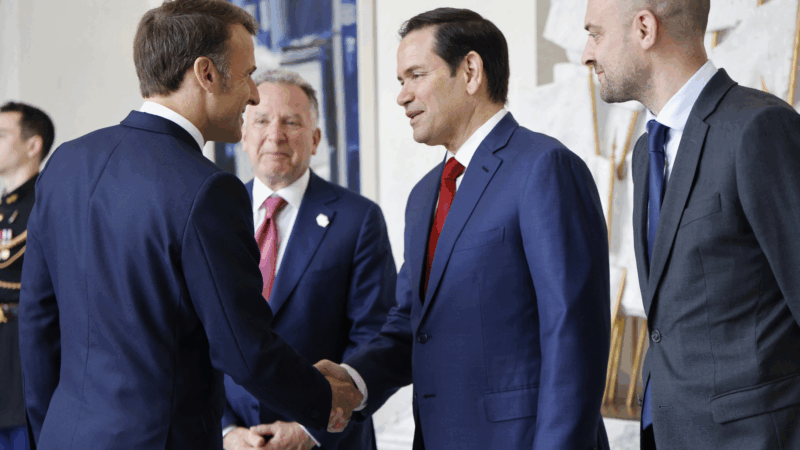Rubio leads a U.S. team for Paris talks as Macron seeks unity on Ukraine
PARIS and KYIV — French President Emmanuel Macron hosted top diplomats from the United States, Germany, the United Kingdom and Ukraine on Thursday to discuss efforts toward a peace deal between Russia and Ukraine, and try to salvage a fraying alliance between Europe and the Trump administration.
“Everyone wants to get peace. A robust and sustainable peace,” Macron said while meeting the U.S. delegation at Élysée Palace. “The question is about phasing.”
The U.S. delegation included Secretary of State Marco Rubio, special envoys Steve Witkoff and Keith Kellogg.
“Very productive meetings at Elysee Palace on efforts to end the Ukraine-Russia war,” Kellogg wrote on the social media platform X, along with a photograph of himself with Ukraine’s representatives.
The State Department said Rubio later spoke with Russian Foreign Minister Sergey Lavrov and said the administration has “now presented to all parties the outlines of a durable and lasting peace.” Witkoff has had multiple meetings with Russian President Vladimir Putin, including last week in St. Petersburg, Russia.
Ukraine has been pushing the U.S. to take a tougher stance on Russia, whose full-scale invasion of Ukraine launched in February 2022 and continues to claim lives. Speaking to journalists in Kyiv Thursday, Ukrainian President Volodymyr Zelenskyy said Witkoff “has adopted Russia’s strategy.”
Ukrainians have criticized Witkoff for statements made to Fox News that a potential peace deal could center on the status of five Ukrainian territories. The Kremlin illegally annexed the southern region of Crimea in 2014 and, since its full-scale invasion, has partially occupied the regions of Donetsk, Luhansk, Zaporizhzhia and Kherson.
“It’s very dangerous because he’s consciously or unconsciously spreading Russian narratives,” Zelenskyy said. “And he does not have the mandate to discuss Ukrainian territories, because our territory belongs to our people.”
Asked about President Trump’s statement calling Russia’s deadly Palm Sunday strike on the northeastern of Sumy “a mistake,” Zelenskyy declined to criticize Trump and pointed out that Rubio had condemned the strike. Ukraine’s president did add that European leaders were far more forceful in their condemnation, slamming Russia for a strike that killed 35 civilians and injured 100.
“I think the [Trump] administration’s soft response reflects the continuation of their current policy,” Zelenskyy said. “I believe they think that this kind of diplomacy, this format, will help bring the war to an end.”
Trump has long said that he wants to end the war quickly. He says he is frustrated with both Kyiv and Moscow, even as his administration appears to have embraced Moscow’s account of the war.
Macron called Zelenskyy before and after Thursday’s meetings. More meetings are planned in London next week.
Eleanor Beardsley reported from Paris and Joanna Kakissis from Kyiv.
House Dem. Leader Jeffries responds to air strikes on Iran by U.S. and Israel
NPR's Emily Kwong speaks to House Minority Leader Hakeem Jeffries (D-NY), who is still calling for a vote on a war powers resolution following a wave of U.S.- and Israel-led airstrikes on Iran.
Iran’s Ayatollah Ali Khamenei is killed in Israeli strike, ending 36-year iron rule
Khamenei, the Islamic Republic's second supreme leader, has been killed. He had held power since 1989, guiding Iran through difficult times — and overseeing the violent suppression of dissent.
Found: The 19th century silent film that first captured a robot attack
A newly rediscovered 1897 short by famed French filmmaker Georges Méliès is being hailed as the first-ever depiction of a robot in cinema.
‘One year of failure.’ The Lancet slams RFK Jr.’s first year as health chief
In a scathing review, the top US medical journal's editorial board warned that the "destruction that Kennedy has wrought in 1 in office might take generations to repair."
Here’s how world leaders are reacting to the US-Israel strikes on Iran
Several leaders voiced support for the operation – but most, including those who stopped short of condemning it, called for restraint moving forward.
How could the U.S. strikes in Iran affect the world’s oil supply?
Despite sanctions, Iran is one of the world's major oil producers, with much of its crude exported to China.




